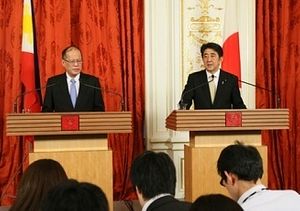As The Diplomat has noted, Japan has become more active on the South China Sea issue this year. Whether it’s exploring the idea of joint patrols of the area with the United States or boosting defense ties with the Philippines, one of China’s rival claimants in the disputed area, the Shinzo Abe administration is making its presence known in the South China Sea – and Beijing is not happy about it.
China dismisses the notion that Japan has any real interests at stake in how the South China Sea disputes are handled. Beijing refuses to acknowledge Japanese (and U.S.) claims that freedom of navigation through this vital shipping lane is at risk. Writing for the Chinese-language edition of Financial Times, Chinese scholar Xue Li argued that Japan’s loudly voiced concern for South China Sea shipping lanes is a “facade” and that Japan’s real motive was a wish to maintain political influence in Southeast Asia and bolster its own position on the East China Sea territorial disputes.
A recent Xinhua article made a similar argument, saying that Japan’s “interference in the disputes aims to divert Beijing’s attention and resources from the East China Sea.” That article accused Japan of trying “to sell its anti-China agenda” at the G7 summit for “its own selfish interests and purposes.” The piece predicted that Abe’s attempt “to forge an unified anti-China stand [would be] futile,” noting China’s important economic ties with G7 members like Germany and the U.K. “[T]hey are more interested in the inclusion of the Chinese currency renminbi in the International Monetary Fund’s Special Drawing Rights currency basket than in the South China Sea issue,” Xinhua predicted.
When the G7 did end up including stern language regarding the East and South China Sea disputes in its joint statement, China’s Foreign Ministry declared the G7 “way out of step with the facts and the internationally recognized principles.”
Foreign Ministry spokesperson Hong Lei revisited the question of Japan’s involvement in the South China Sea issue on Friday, accusing Tokyo of “abnormal” behavior and of having “maliciously created tensions in the South China Sea.” “Japan is not a party concerned to the South China Sea issue,” Hong said, adding that Japan’s interest in the issue “runs counter to the momentum of improving bilateral relations” between China and Japan.
The response outlined above is similar to the way China dismisses U.S. involvement in the South China Sea. With Japan, however, there’s an added line of argument: that Tokyo, particularly under the Abe government, has no right to speak out on the issue due to its own messy legacy with history. “It is advisable that Japan, which still owes sincere apologies to the victims of its wartime atrocities, shoulder responsibilities to maintain regional security and stability instead of backing ridiculous and unreasonable claims by some countries for South China Sea islands,” one Xinhua op-ed argued.
A more pointed Xinhua piece, published soon after the G7 statement came out, said that Abe, “as a brazen historical revisionist… is not qualified to talk about the rule of law.” Under this argument, Abe is drumming up the “China threat” in the South China Sea for two reasons: to further his security agenda for Japan and to distract from his reluctance to apologize for wartime atrocities.
The East China Sea issue has quieted in recent months (as Andi Zhou recently pointed out) and has been largely absent from Chinese media coverage. But the same diatribes launched against Japan during the height of tensions over the Senkaku/Diaoyu Islands are creeping back into Chinese state-run media as criticisms of Japan’s South China Sea policy. Historical “whitewashing,” exaggerating the “China threat,” ignoring China’s historical rights to preserve Japan’s own geopolitical status – similar themes pervade the recent pieces on the South China Sea and earlier articles on the Senkaku/Diaoyu dispute.
Added to that mix is China’s continued denials that any non-claimant country — whether Japan, the United States, or the G7 members — has a legitimate interest in how the disputes are handled or resolved. Instead, China argues that it and ASEAN are the only ones qualified to speak on the South China Sea.

































